5 Best Beam Reloading Scales + Buyer’s Guide
My buddy who started reloading ammo recently had run into some accuracy issues while weighing the charges to refill his rounds and was looking for a reliable scale. His measurements had turned out to be inconsistent, and he ended up reloading similar rounds with different amounts of gunpowder. So he had a question for me: Are beam reloading scales a better option to weigh shot charges accurately?
When reloading spent cartridges, it’s important to make sure the charges that go in the cartridge casing are in the correct amount–or else your newly reloaded shots can be faulty. This is where beam reloading scales can help since they let you weigh your charges super accurately and leave very little room for error.
I compiled a guide on the best beam reloading scales I’ve used for those who, like my buddy, are looking for reliable scales for reloading ammo. I have also added a buyer’s guide to help you decide on which scale to buy. Before we get to the list of best beam reloading scales though, let’s find out how to use one.
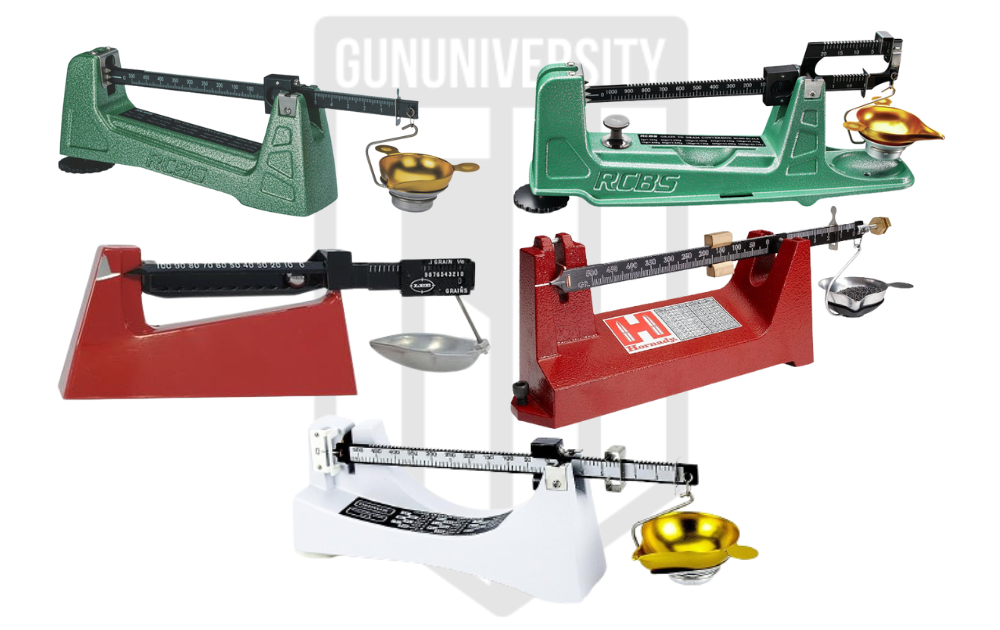
How to Use a Beam Reloading Scale
Getting started with a beam scale for reloading ammo can be challenging at first, but it gets easier once you get the hang of it. Let’s have a look at a beam reloading scale and how you can use it to weigh charges.
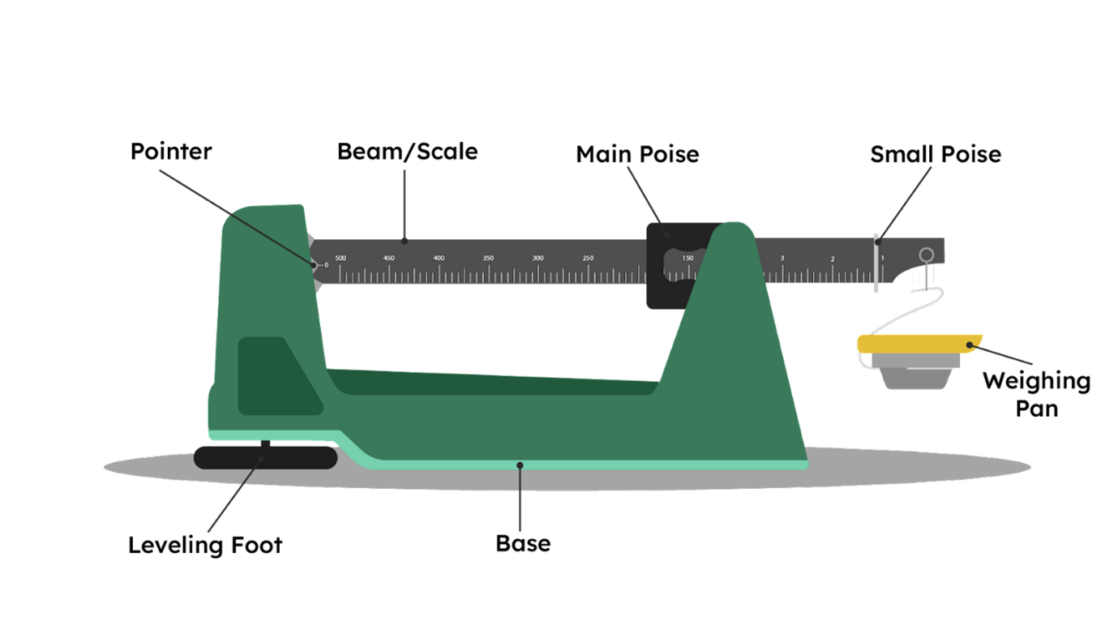
- Step 1 – Calibrating makes sure the scale reads accurately by ‘zeroing’ it, which means leveling the zero on the beam to the pointer when the weighing pan is empty. If the scale doesn’t read zero, you have to place it on level ground and adjust the leveling foot until the beam zeroes. That said, most beam scales come factory-calibrated, and you can follow the user manual for any further adjustments.
- Step 2 – Weighing the charges has to be done carefully because even a single-grain difference can throw off the performance of your shot. First, you have to add the gunpowder or shot pellets into the weighing pan in small amounts. Next, you need to guess the weight and adjust the poises (sliding weights) along the beam. For example, if you think the charge weighs 150 grains, you need to move the main poise along the beam scale to get to the 150 mark. If the beam doesn’t level to zero, you need to move the main poise and the small poise (which indicates decimal amounts) back and forth until you get the reading to zero. A good practice is to look at the scale from the eye level; it helps avoid errors caused by an indirect line of sight.
- Step 3 – Maintenance is important in beam reloading scales to make sure you get accurate readings consistently. Consider zeroing (calibrating) your scale regularly to maintain consistent accuracy. You can also use check weight sets with different grain amounts to test the scale and confirm it gives accurate readings. Make sure to wipe the weighing pan with a dry cloth after every use, because if gunpowder residue remains in the pan, it can seriously throw off your reading. Try to keep the beam reloading scale at a designated, level surface without moving it, because an uneven base can make it difficult to get to zero.
Now, beam reloading scales can look like they need some work, but they are accurate and consistently reliable, making them an important part of any reloading kit.
Gun University’s Choices of the Best Beam Reloading Scales
Best Beam Reloading Scales
Best overall RCBS M500 Mechanical Scale | 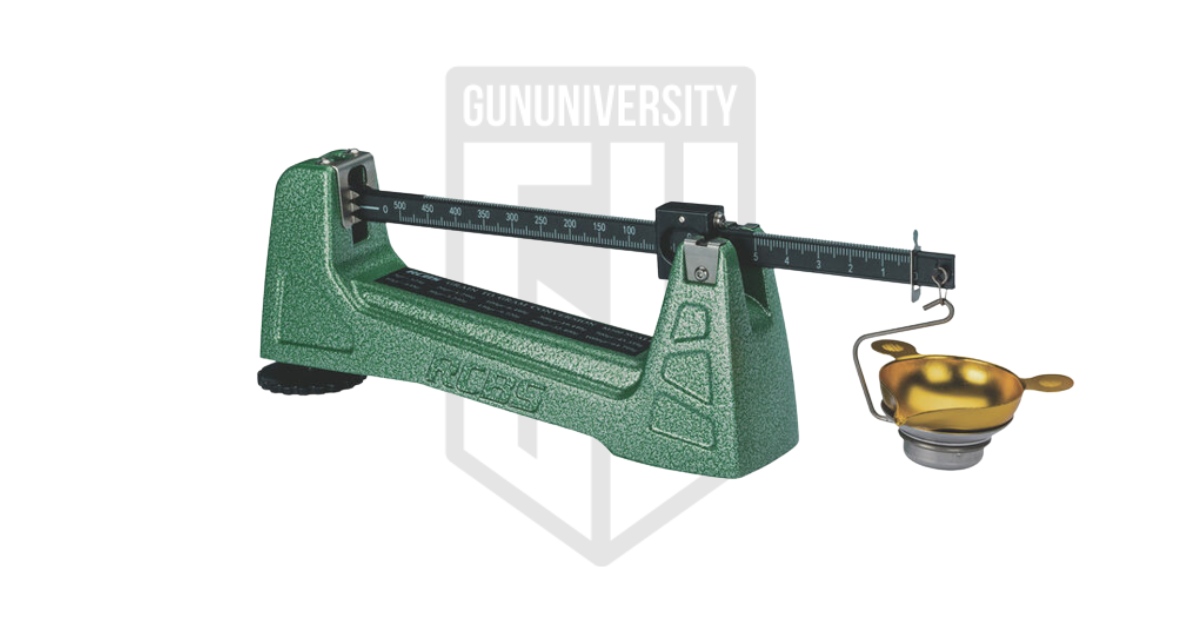 |
| Buy on Amazon |
Best stability Hornady Lock-N-Load Balance Beam Scale | 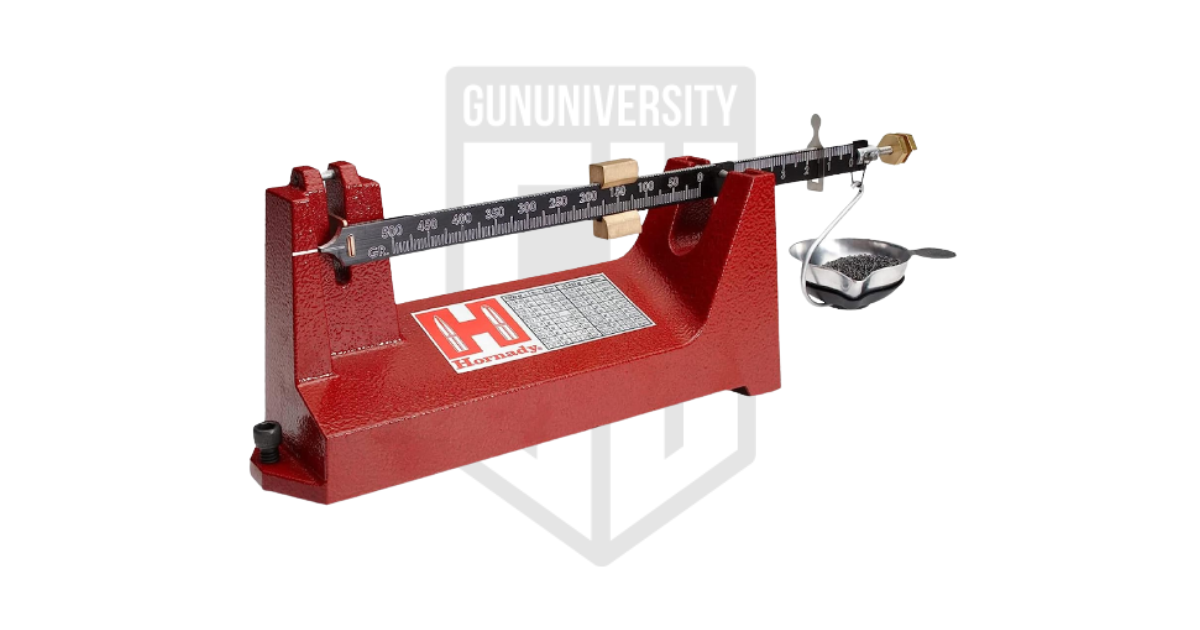 |
| Buy on Amazon |
Best capacity RCBS M1000 Magnetic Powder Scale | 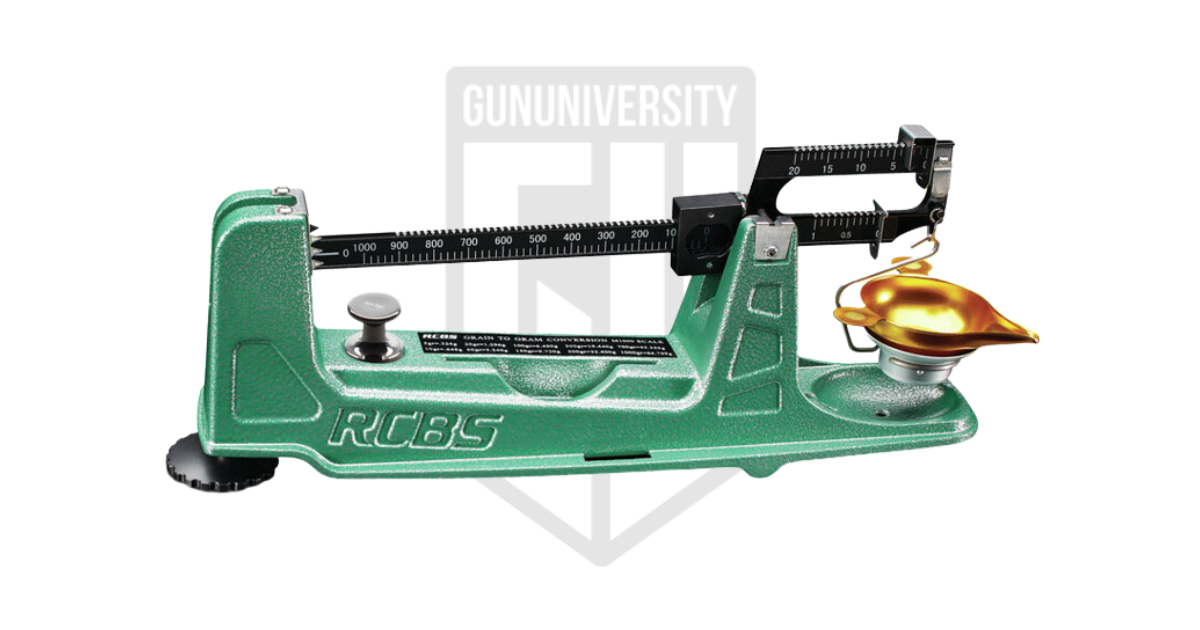 |
| Buy on Amazon |
Best compact OHAUS 5-0-5 Reloading Beam Scale | 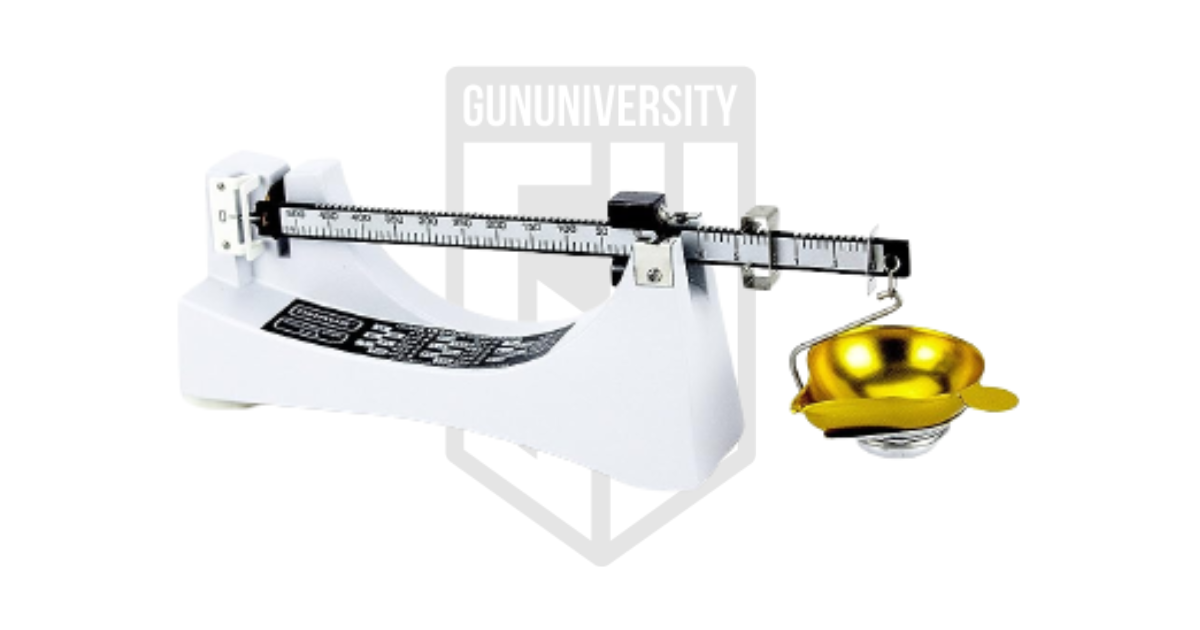 |
| Buy on Amazon |
Best budget Lee Precision Safety Powder Scale | 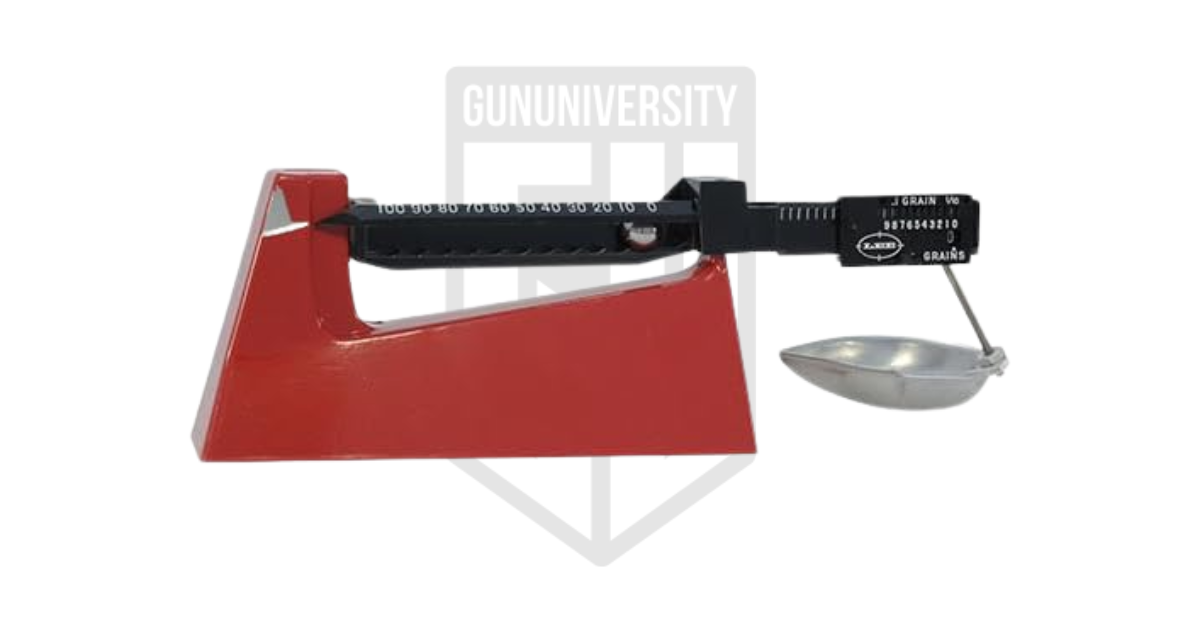 |
| Buy on Amazon |
Beam Reloading Scales Spec Comparison
Below is a table of the specifications for each of the beam reloading scales.
| Reloading Scale | Weight (oz) | Capacity (grains) | Material | Grain Accuracy |
|---|---|---|---|---|
| RCBS M500 Mechanical Scale | 16 | 505 | Die-cast metal | +/-0.1 |
| Hornady Lock-N-Load Balance Beam Scale | 18 | 500 | Cast iron | +/-0.1 |
| RCBS M1000 Magnetic Powder Scale | 17 | 1000 | Composite | +/-0.1 |
| OHAUS 5-0-5 Reloading Beam Scale | 9.6 | 511 | Metal | +/-0.1 |
| Lee Precision Safety Powder Scale | 14.6 | 100 | Phenolic plastic | +/-0.05 |
Best Beam Reloading Scales
Here is our list for the best beam reloading scales.
- RCBS M500 Mechanical Scale
- Hornady Lock N loaded Balance Beam Scale
- RCMS M1000 Magnetic Powder Scale
- OHAUS 5-0-5 Reloading Beam Scale
- Lee Precision Safety Powder Scale
Best Beam Reloading Scales – Reviews
While the beam reloading scales I’ve chosen are all performer great, I’ve sorted them according to their best feature. This can help you narrow the choices down to a beam reloading scale that works for your needs.
Best overall RCBS M500 Mechanical Scale
- Durability A+
- Stability A-
- Accuracy A+
- Ease of use A
Our Grade
A
Reader’s Grade
TBD
Based on 0 Reviews
Your Grade
Do You Own This Accessory? Leave A Review
Success Your Grade Has Been
Added To Our Reader’s Score
We use email to verify the accuracy of our reviews. We promise to never spam you.
RCBS M500 Mechanical Scale
- Weight 1 lb
- Capacity 505 grains
- Material Die cast metal
- Grain accuracy +/- 0.1
RCBS M500 Mechanical Scale Review
My overall best pick was an easy choice because the RCBS M500 Mechanical Scale comes from a long line of scales known for their convenience and consistent accuracy. This model is no different. It also made our list of best reloading scales for hand-loading ammo as the only mechanical scale among the electronic ones. That speaks a lot about its performance.
Using the RCBS M500 has been a great experience, especially compared to other beam scales I’ve worked with. Efficiency is where this scale really stands out—it doesn’t waste my time like some others. The magnetic damping system near the pointer helps the beam settle quickly, giving me faster readings than most beam scales. Sure, it’s not as immediate as an electronic scale, but the speed and consistency make up for it.
Out of the box, the RCBS M500 came factory-calibrated, but I checked it with my weights to be sure. At 1, 5, 10, 50, 100, and even 300 grains, the readings were spot-on. I even ran 15 consecutive tests with a 100-grain check weight, and every single time, the beam zeroed perfectly. That reliability gives me peace of mind knowing my loads are accurate.
The scale’s design is user-friendly, with clear white markings on a black scale for easy readability. The ambidextrous layout is a nice touch, too—it works great whether you’re right- or left-handed.
My only gripe is its lightweight construction, at just 1 lb. While the die-cast aluminum base keeps it stable, I would’ve liked a bit more heft. Some folks might find it too easy to knock over, but I’ve managed fine on my bench.
At around $140, it’s a bit pricier than average, but for the accuracy and efficiency the RCBS M500 delivers, I think it’s worth every penny.
RCBS M500 Mechanical Scale Pros and Cons
- Ambidextrous
- Uses magnets to stabilize the weighing pan
- Efficient readings
- Consistent accuracy
- Lightweight
Best stability Hornady Lock-N-Load Balance Beam Scale
- Durability A
- Stability A
- Accuracy A+
- Ease of use A-
Our Grade
A
Reader’s Grade
TBD
Based on 0 Reviews
Your Grade
Do You Own This Accessory? Leave A Review
Success Your Grade Has Been
Added To Our Reader’s Score
We use email to verify the accuracy of our reviews. We promise to never spam you.
Hornady Lock-N-Load Balance Beam Scale Specs
- Weight 1 lb 2 oz.
- Capacity 500
- Material Cast iron
- Grain accuracy +/- 0.1
Hornady Lock-N-Load Balance Beam Scale Review
The Hornady Lock-N-Load Balance Beam Scale is my top pick for best stability. Not only because of its heavy weight and material, but also because the sturdiness of the scale helps maintain consistent accuracy.
Stability is super important in a beam reloading scale. When a scale is sturdy, it’s more likely to hold its place on the reloading bench and less likely to be affected by environmental factors. These factors could be currents of wind from hot air vents or breeze. The Hornady Lock-N-Load Scale weighs around 1 lb 2 oz. This makes it a lot heavier than other beam scales of 500-grain capacity and far more stable than most beam scales on my list.
I’ve had this balance scale on my reloading bench for years, and it doesn’t budge an inch. Once it’s balanced and zeroed, I can trust it to stay that way. Honestly, the cast iron construction has been a lifesaver for durability and stability, though I’ve heard newer models use plastic. I can’t speak to those, but mine has held up perfectly.
Accuracy is excellent, down to a tenth of a grain. Testing it with check weights, I found the readings spot-on every time, so now I only recheck every 50 charges. The magnetic damping system is a big bonus, quickly settling the beam and pan for faster measurements.
The one downside? Calibration took a bit of effort due to the screwed-in nail instead of a leveling foot. But once set, it stays put—a trade-off I’ll take any day. At about $90, the consistent performance and reliability of this balance scale make it well worth the investment.
Hornady Lock-N-Load Balance Beam Scale Pros and Cons
- Reasonably priced
- Easy-to-read laser etched beam
- Uses magnets to stabilize the weighing pan
- Tricky to calibrate
Best capacity RCBS M1000 Magnetic Powder Scale
- Durability A+
- Stability A+
- Accuracy B
- Ease of use A
Our Grade
A
Reader’s Grade
TBD
Based on 0 Reviews
Your Grade
Do You Own This Accessory? Leave A Review
Success Your Grade Has Been
Added To Our Reader’s Score
We use email to verify the accuracy of our reviews. We promise to never spam you.
RCBS M1000 Magnetic Powder Scale Specs
- Weight 1 lb 5 oz.
- Capacity 1000
- Material Composite
- Grain accuracy +/- 0.1
RCBS M1000 Magnetic Powder Scale Review
RCBS scales have served me well for years, with amazing accuracy and efficiency. I am not surprised two of them made the list, this time as the pick for best capacity.
The RCBS M1000 Magnetic Powder Scale has an impressive 1,000-grain capacity. This feature makes it the ideal choice for those handling large loads or multiple loads. It has an accuracy of +/- 0.1 grain sensitivity, so it can give you consistent measurements.
One feature I especially like in the RCBS M1000 is its three-poise system:
- Main poise – adjustment options from 0 to 1000 grains
- Top medium poise – 0 to 20 grains in 1 grain increments
- Bottom small poise – 0 to 1 grain adjustments in 0.1 grain increments
The scale is helpful for measuring big loads accurately by allowing you to balance weights with small increments.
When I first set up the RCBS M1000 Magnetic Powder Scale, I noticed how intuitive the design was. Adjusting the poises is straightforward, and the grooves along the beam keep them securely in place. The weighing pan feels stable, so I didn’t have to worry about it tipping during use. The magnetic damping system is a real time-saver—it speeds up stabilization and cuts down on the waiting time for the beam to settle.
I also appreciated the adjustable leveling foot. Whether I used it on my bench or a less-than-perfect surface, I could quickly level the scale without fuss. The included check weight is great for confirming calibration, though it arrives factory-calibrated and was spot-on from the start. Plus, being ambidextrous makes it a flexible option for any reloader.
While working on some large rifle loads for hours, I found the scale maintained its accuracy. I wiped the weighing pan occasionally to avoid residue buildup, but I never had to recalibrate mid-session.
That said, the leveling foot can move slightly on its own, which I found a bit frustrating. And at around $190, it’s the priciest beam scale I’ve used. Still, for capacity, precision, and ease of use, the RCBS M1000 is worth it—if you catch it on sale.
RCBS M1000 Magnetic Powder Scale Pros and Cons
- Ambidextrous
- Easy to set up and use
- Uses magnets to stabilize the weighing pan
- Durable
- Leveling foot comes loose sometimes
- Expensive
Best compact OHAUS 5-0-5 Reloading Beam Scale
- Durability A-
- Stability B
- Accuracy A
- Ease of use A
Our Grade
A-
Reader’s Grade
TBD
Based on 0 Reviews
Your Grade
Do You Own This Accessory? Leave A Review
Success Your Grade Has Been
Added To Our Reader’s Score
We use email to verify the accuracy of our reviews. We promise to never spam you.
OHAUS 5-0-5 Reloading Beam Scale Specs
- Weight 9.6 oz.
- Capacity 511 grains
- Material Metal
- Grain accuracy +/- 0.1
OHAUS 5-0-5 Reloading Beam Scale Review
The OHAUS 5-0-5 Reloading Beam Scale became my pick for best compact because its small size, without compromising on accuracy, consistency, and ease of use.
I’ve been using this scale for a while now, and its compact design really stands out. It’s easy to store, even in my limited workspace, and keeping it covered to protect it from dust or moisture is simple. For anyone without a dedicated reloading setup, this is a huge plus.
Calibration is straightforward, thanks to the included aluminum check weights. Setting it up on a level surface and balancing it with the leveling foot wasn’t difficult, but I’ll admit, it took a little longer compared to other beam scales I’ve tried. That said, once it’s dialed in, the OHAUS 5-0-5 holds zero incredibly well, even after multiple charge measurements.
Accuracy is where this scale really shines. It’s precise to one-tenth of a grain and has a magnetic damping system, so the beam settles quickly without compromising sensitivity. The high-contrast faceplate and black poise make readings easy to see—something I always appreciate.
If I have one gripe, it’s the lightweight frame. At just 10 ounces, it feels a bit flimsy. While the rugged base keeps it steady enough, I’ve considered adding weight to make it more stable.
At $75, the OHAUS 5-0-5 offers unbeatable accuracy, readability, and portability in a compact package, which is why it’s a solid choice for reloading enthusiasts like me.
OHAUS 5-0-5 Reloading Beam Scale Pros and Cons
- Highly accurate results
- Magnetic stabilization to speed reloading
- High readability
- Not very stable
- Slow
Best budget Lee Precision Safety Powder Scale
- Durability A-
- Stability A
- Accuracy A
- Ease of use B
Our Grade
A-
Reader’s Grade
TBD
Based on 0 Reviews
Your Grade
Do You Own This Accessory? Leave A Review
Success Your Grade Has Been
Added To Our Reader’s Score
We use email to verify the accuracy of our reviews. We promise to never spam you.
Lee Precision Safety Powder Scale Specs
- Weight 14.6 oz.
- Capacity (grain) 100
- Material Phenolic plastic
- Grain accuracy +/- 0.05
Lee Precision Safety Powder Scale Review
I chose the Lee Precision Safety Powder Scale as my best budget pick. Even with a price tag of 40 bucks, the scale has the accuracy, consistency, and the durability of higher-priced beam scales.
This scale is very precise and accurate, as it comes calibrated with weights that are certified traceable to the United States Bureau of Standards. It’s also incredibly sensitive, able to read to +/-0.05 grain (one twentieth of a grain), which is perfect for those small loads I sometimes need to measure.
I use the Lee Precision Safety Powder Scale as a backup for my electronic scales, especially when I’m reloading a series of rounds and my batteries run out. It’s also great for double-checking the accuracy of my other scales. While it has a lower grain capacity than most beam scales, it works well for weighing smaller loads or as a cross-checking tool. I’ve been using this lee scale for almost five years now, and despite my initial doubts about the plastic beam, it’s still holding up strong without any false readings or wear. I do recalibrate it every so often to ensure it stays consistent, though.
One downside I’ve noticed is that the lee safety scale can be affected by temperature changes and vibrations, so I keep it in a stable, low-traffic area when I’m reloading. And while it’s not the easiest scale to get the hang of at first, a little practice goes a long way. Overall, it’s a reliable, budget-friendly option for precise reloading.
Lee Precision Safety Powder Scale Pros and Cons
- Precise readings
- Durable
- Ideal for weighing small to medium loads
- Slow to set up
- Easily affected by environmental factors
Beam Reloading Scales – Buyer’s guide
Choosing a good beam scale can help you reload ammo with precise charges, so getting one that fits your requirements is important. I’ve put together this buyer’s guide to point you in the right direction toward purchasing a beam reloading scale that meets your requirements.
Choosing between mechanical and electronic scales
Mechanical scales (like the beam reloading scales on this list) and electronic scales both have their own pros and cons, and one is not really better than the other. Here’s a laook at how each performs in several categories that I feel are the most important to consider when evaluating your options.
| Mechanical reloading scale | Electronic reloading scale | |
|---|---|---|
| Accuracy | Consistent and reliable, needs recalibration from time to time | Accuracy can get affected by battery issues, overheating, vibrations etc. |
| Functioning mechanism | No external power needed, but the mechanical parts have to be well-adjusted | Operated by electricity from batteries or a power outlet |
| Ease of use | Some effort needed. The scale has to be calibrated and checked for accuracy, and weighing takes some effort as well | Extremely easy to use, only requires switching on and placing the charges on the scale |
| Time | Takes some time to get accurate measurements | Results are immediate |
| Cost | Averages around $90-$100 | Averages around $50 |
| Durability | Often made from cast metal with high durability | Often made from a plastic material with low durability |
Personally, I use a few mechanical beam scales because they are consistently reliable and my reloading setup is stationed at home, so I don’t have a need to carry it anywhere. If I had to take a reloading scale to the range though, I would go for an electronic scale because it’s much more convenient than taking a mechanical one and setting it up.
Finding the best reloading scale for you comes down to your personal needs, priorities, and the complexity of the ammunition reloading you plan to do. Let’s take a look at some factors you should consider when narrowing down your options.
Factors to consider when choosing a beam reloading scale
These are some of the factors you should look at when figuring out what you need from a beam reloading scale.
- Accuracy – The weight of the charge affects the performance of your shot, so you have to be as accurate as possible when reloading ammo. Most beam reloading scales have an accuracy of +/- 0.1 (one tenth of a grain) and it’s good to look for that grain accuracy as a standard. There are beam scales with even more sensitivity up to one twentieth of a grain, but to get started with reloading ammo, +/- 0.1 grain accuracy is just enough.
- Capacity – The most common capacity for beam reloading scales is 500-grain, and this works for almost any reloader. If you reload cartridges with a high load though, you can go for a scale with 1000-grain capacity, but it will drive up the cost of the scale a bit. If you’re only using the beam scale for small loads or to check the accuracy of electronic scales, a low-capacity beam scale at 100-grains might work.
- Size and Weight – While most scales come in roughly the same dimensions, they usually vary in weight. Heavier beam scales that weigh over 1 lb can hold up well against environmental factors like vibrations and breeze, giving you stability and helping maintain consistent accuracy. Lightweight and compact beam scales can be stored easily, plus they are more convenient to carry around.
- Durability – Beam reloading scales are often made from composite metal, so their durability is often reliable. Plastic material is usually easy to break and can soften in heat, so if your choice of a beam scale is made of plastic, make sure the material is treated to last long.
- Ease of use – Generally,beam scales are not considered user-friendly, but there are few things you can consider to pick out a beam scale that’s easy enough to use. Look out for an easily adjustable leveling foot to help with calibration, and make sure the numbers and grading on the scale are clearly visible. If you’re left-handed, look out for beam scales designed with markers on both sides of the beam for better accessibility.
These factors can help you decide on a beam reloading scale to purchase, and once you put some effort into setting it up and getting the hang of the scale, you’ve got a reliable device to help make your ammunition reloads much easier.
Conclusion
Reloading your spent cartridges is a delicate business, but with the right tools, you can design your own ammo and save a few bucks while you’re at it. That’s why a beam reloading scale is a must-have in your reloading kit; it can help you weigh the right amount of charges for a shot that performs as same as (and often better than) off-the-shelf ammo. Don’t hesitate to pick out a beam reloading scale that best fits your needs, even if it’s tricky to operate. Once you get the hang of it, your charges will come out consistently accurate.
Best Beam Reloading Scales – FAQs
How accurate are beam scales for reloading ammo?
Beam scales can be accurate within one tenth (0.1) of a grain for reloading ammo. The accuracy can change slightly with different models, but as long as you zero the scale before using it, you’ll be good to go. Consider using a set of check weights to routinely verify the accuracy of your scale.
What is the best scale for weighing powder?
The RCBS M500 is a great option to weigh gunpowder because it’s accurate to one tenth of a grain and maintains consistent accuracy. It comes with a tip-proof weighing pan to make sure the gunpowder doesn’t tip over, and has a rugged aluminum base for stability.
How do I choose a reloading scale?
Choose a reloading scale according to the capacity and precision you need. Consider the number of rounds you will be reloading and the amount of powder required per round to decide on the capacity. The precision of your scale also helps make your rounds consistent, so choosing a scale that’s accurate to 0.1 of a grain is a pretty safe bet. You can also consider other features like durability and ease of use to pick a well-rounded scale.
Which is better – a mechanical or a digital scale?
Both types of scales have their pros and cons, and the best choice for you depends on your requirements. Mechanical scales are a better option if you need consistently accurate readings on a reloading setup stationed at your home. Digital scales are easy to carry around and give fast readings, so they are a better fit if you need to take a scale to the range.
What’s the difference between a beam reloading scale and an electric scale?
A beam reloading scale uses a mechanical system with a balance beam to measure weight, while an electric scale relies on electronic sensors to provide readings. Beam scales are often preferred for their accuracy and reliability, especially for small-scale, precise measurements in reloading. Electric scales can be quicker and more convenient but may require more frequent calibration and maintenance.
How often should I calibrate my beam reloading scale?
You should calibrate your beam scale every time you use it to ensure the most accurate readings. If you’re using it frequently, consider calibrating it before and after each reloading session. Calibration weights are essential for verifying accuracy, so it’s good practice to check the scale regularly to avoid measurement errors.
Recent Posts
January 30, 2026
January 29, 2026
January 19, 2026

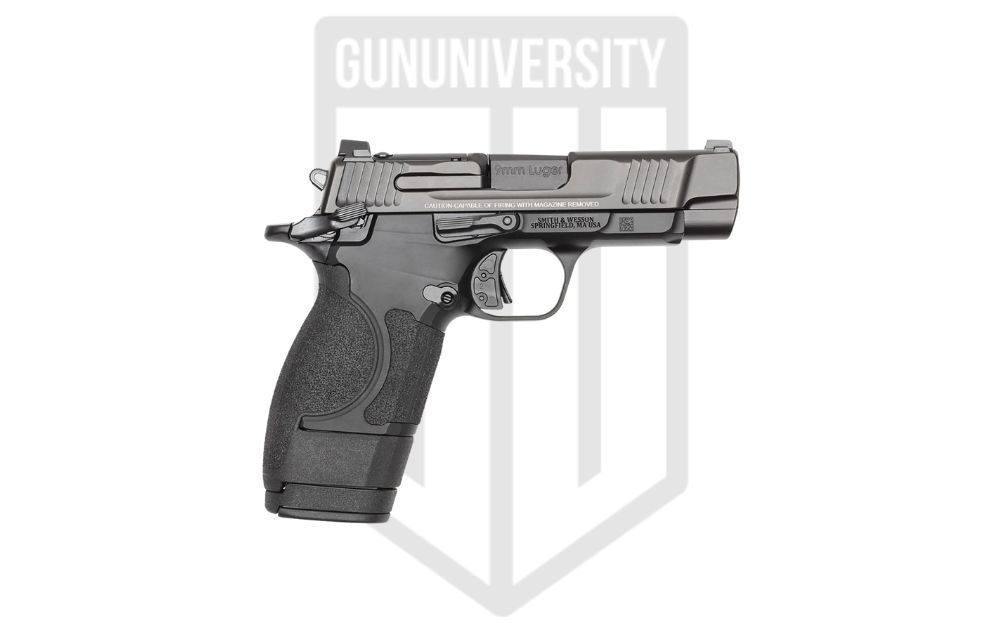
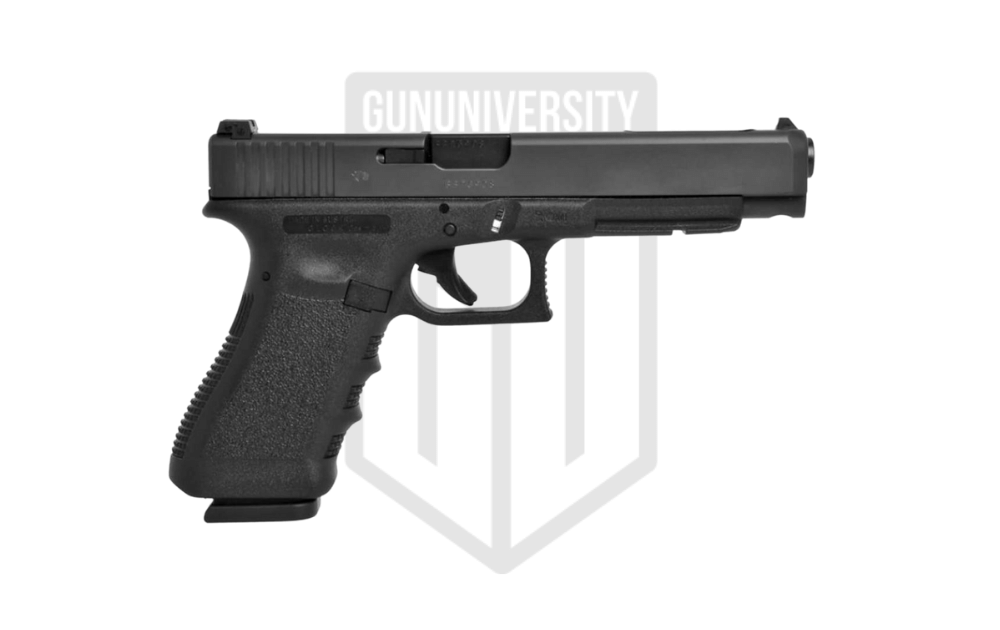
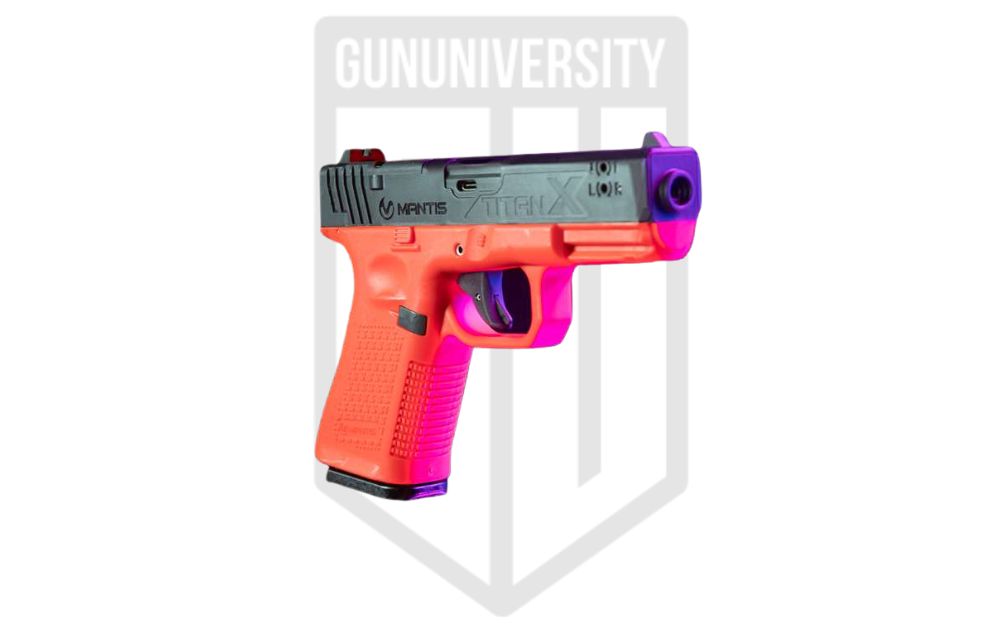
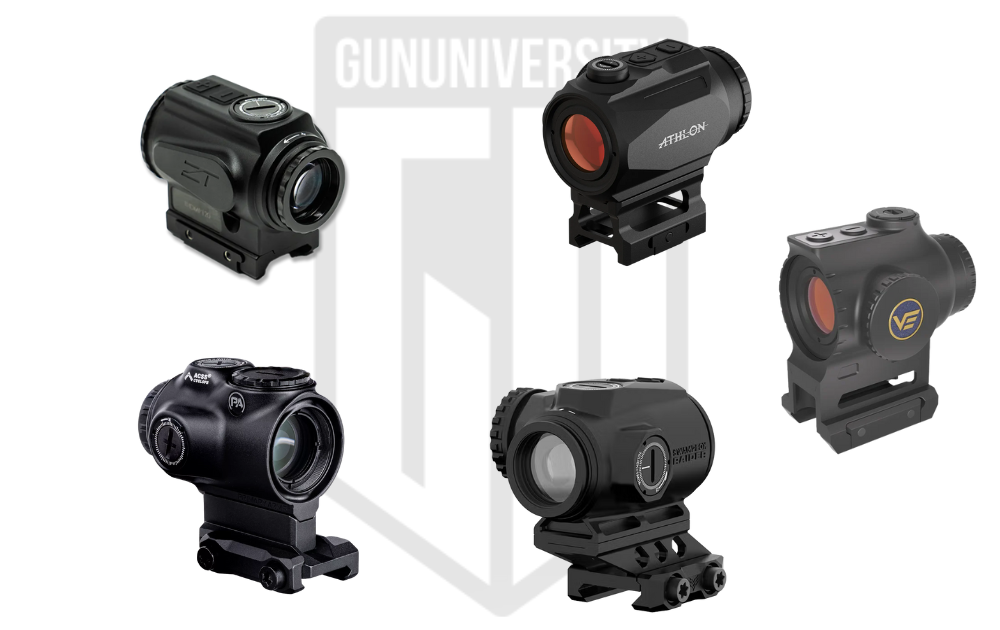
GREAT ARTICLE, WELL PUT TOGETHER! Just thought that I’d add that RCBS ALSO sells the 5-0-5 model which is the EXACT SAME as OHAUS but green, I have one and love it. It’s awesome.!